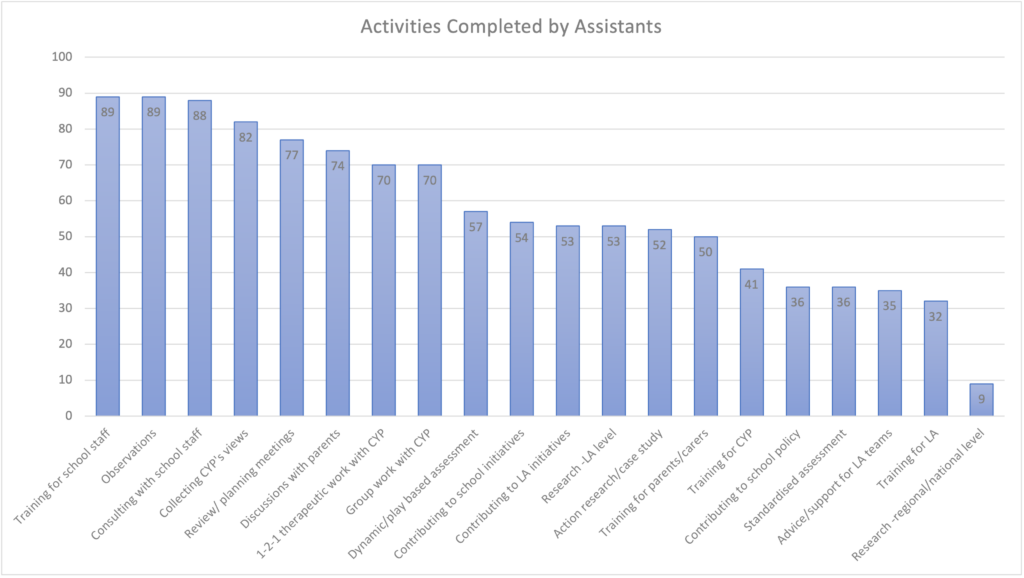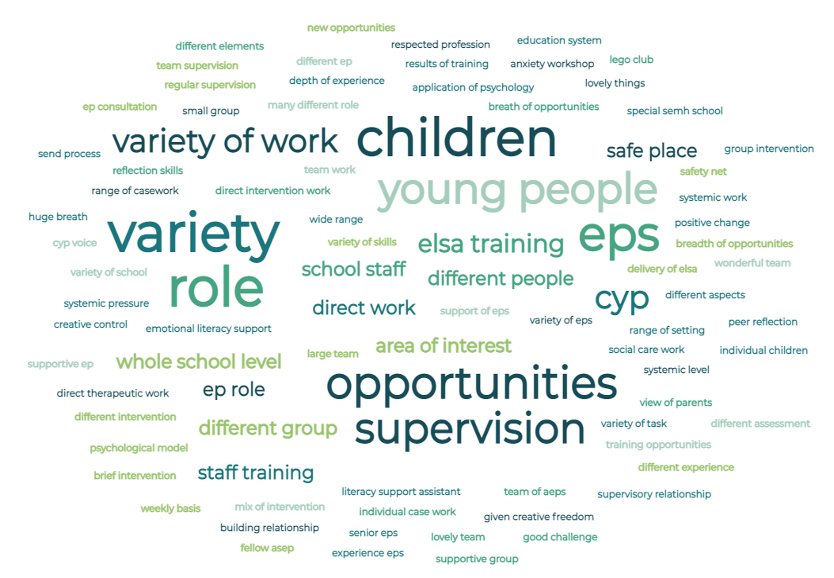The role of an Assistant Educational Psychologist is an evolving one which is highly competitive and desirable for aspiring Educational Psychologists (EPs).
To compliment and inform this blog we have also produced:
- A policy briefing designed for service leads
- A full research report
Assistants work under direct guidance and EPs, assisting the overall work of Educational Psychology Services (EPSs). However, there is significant variation in the role and responsibilities of Assistant Educational Psychologists (AsEPs) and Assistant Psychologists (APs) across different EP services and little current literature exists which documents this (Woodley-Hume & Woods, 2019). Discussions at regional and national assistant network meetings between December 2021 and May 2022 highlighted this variation across the UK.
We asked assistants working in EP services to help us gather a clearer picture of the roles and responsibilities of assistants in England. Our research involved an online survey, completed by 96 assistants working in Educational Psychology contexts in England. The survey was widely publicised through assistant networks, edpsy, the AEP mailing list and social media between May and July 2022. In the absence of a framework specific to assistants, questions on activities undertaken were based on the core functions of the EP according to the Currie report (Scottish Executive, 2002).
Prior Experience & Working Conditions
We asked assistants to tell us about the number of years’ experience they had before securing an assistant role. Assistants began their posts with varying levels of experience working with children and young people. Most assistants had 2+ years prior experience and half of assistants had 5+ years.
Job title variation
- 77 respondents held the title Assistant Educational Psychologist (AsEP),
- 16 Assistant Psychologist (AP)
- 1 Lead AP
- 2 Psychology Assistant.
Anecdotal reports from assistant network meetings suggest that typical responsibilities do not always vary according to job title, although salaries often do.
Assistant pay
We asked assistants if they are paid accordingly to the Soulbury scale, 71.9% of all respondents answered yes.
84.4% of AsEPs were paid in line with Soulbury recommendations, compared with 21.1% of those with a different title.
The Association of Educational Psychologists (AEP) is the trade union for Educational Psychologists in the UK. The AEP have a set admission criterion for AsEP membership; one of the requirements states that members should be “…paid on the Soulbury Scale for Assistant Educational Psychologists or equivalent” (AEP, 2019). Subscription offers benefits such as legal advice and continual professional development opportunities; assistants without the AsEP title or who are not paid on Soulbury scale may not have access to these offers.
Activities
When asked about activities undertaken in the role the most common responses are illustrated below;

The most frequent activity undertaken by assistants was training for school staff. Examples of this included:
- ELSA training and supervision
- Emotion coaching
- Precision teaching
- PATH graphic facilitation
- Circle of adults
More than half of assistants gained experience in all the five core functions of the EP according to the Currie matrix: Training, Consultation, Intervention, Assessment and Research. Research was the most common core function that was not undertaken by AsEPs and APs. A lack of research opportunities was reflected throughout with research at regional/ national levels being the least frequent activity undertaken. When asked about any other activities they carried out, 15 respondents mentioned generic admin, including proofreading, note taking during meetings and ordering resources.
When asked about assessment, the most common forms completed by assistants were play-based and dynamic assessment. 36 assistants also administered standardised or psychometric assessments. One assistant raised concerns about this stating ‘I’m not a TEP or EP so I have not received the appropriate training and this raises ethical concerns with me!’.
When we asked assistants about casework responsibility, 51 assistants (53%) said they took full individual responsibility for casework with EP oversight. Previous research (Collyer, 2012; Monsen et al., 2009) highlights debates around whether casework is within the competence and remit of assistants.
Our data suggest that assistants carry out a wide range of activities – from tasks similar to those of a fully qualified EP to those expected of an administrative assistant. However, it has been suggested that the conflation of the role of EP and assistant is undesirable as it could lead to a devaluation of the profession (Collyer, 2012). On an individual basis, with such a wide scope of duties there may be a risk of either under- or over-expectation of assistants (Woodley-Hume & Woods, 2019).
Favourite part of the assistant role
We asked assistants what their favourite part of the role was; the clearest theme was variation. Respondents stated they enjoyed the “variety in the job! No two days are the same” and said “one day I can be facilitating supervision for ELSAs and the next I can be working directly with young people.”
Assistants spoke about enjoying positive challenge which supported their professional growth, “it’s challenging, but it’s a good challenge, one which I am enjoying” and “There is also so much scope to learn, challenge yourself, and pursue areas of interest”. Having opportunities to learn and develop practice was highly valued.
Many mentioned supervision as a favourite part of the role. Respondents commented “…I have really benefited from supervision myself and have developed my reflection skills” and they valued “supervisory relationships that ensure I am developing my own competencies”. One mentioned “a very supportive EP who has been a safety net”. These responses demonstrate that supervision allows a space for reflection, a sense of safety and support.
A favourite aspect for many was working directly with children and young people. Assistants enjoyed “providing person centred strategies to enable children and young people achieve what they want to achieve” and “ensuring their views are heard”. Working with the child through person-centred practice and using a holistic model to support children, young people and families was important to many assistants. Additionally, making a difference and affecting change through working with children and young people who were “marginalised” or “written-off”’ was a common response.

Doctorate Prospects
We asked assistants if they had been encouraged to apply for the doctorate and if they had secured a place on a course beginning in 2022. 91% of assistants were encouraged to apply within their role and 47% of respondents had gained a place on courses for September 2022.
The Soulbury Report (2019) suggests that ‘those local authorities who employ Assistant Educational Psychologists should take positive action to ensure that these employees achieve qualified status as soon as possible…’ This suggests that EP services are committed to the current training model and continue to view assistant roles as temporary roles and opportunities to upskill and prepare candidates for doctoral training.
Given the total overall success rate for courses in 2021 was 17% (AEP, n.d.) this also highlights the advantages the role offers applicants, although assistant experience is not essential for further training, as illustrated in Becoming an EP – #NoWrongPath – edpsy.org.uk (O’Hare, 2021).
Final Thoughts
The results discussed in this blog highlight the variety of activities that can be undertaken by assistants in the role of Assistant Educational Psychologists and Assistant Psychologists working across different EP services. With many assistants undertaking casework independently and working within several functions of the Currie matrix, we hope the results will generate discussion amongst the profession around what tasks are qualified EP specific and what is appropriate and ethical for assistants to undertake, hopefully providing clarity around activities and working conditions in the assistant role.
Additionally, the findings can be used to guide aspiring assistants on what to look for and think about when securing an assistant role, or when first taking up an assistant post. We found the Currie matrix useful in categorising responsibilities and it might be a helpful framework to support the induction process of assistants when identifying areas for development.
Equally, it is important that conversations around prior experience are held to avoid over- or indeed under-expectation of assistants, ensuring the best preparation for the doctorate training is being offered and that assistant input can be maximised.
- Read our policy briefing (two pages)
- Read our full research report
Acknowledgements
We would like to thank:
- All the assistants who completed our questionnaire – without you this would not have been possible – and wish you all good luck in your journeys to becoming EPs
- Our supervisor, Maxine Caine, and Gateshead Psychological Service for supporting us with this research.
- We would also like to thank Dr Dan O’Hare and edpsy for incredibly useful advice and for sharing our project on the blog and on Twitter.
Sophie, Debs and Kate’s EP Reach-Out webinar: Assistants working in EP services in England. Who are they and what do they do?
References
Association for Educational Psychologists [AEP] (n.d.). Information on applications for initial training in England. Retrieved August 8th, 2022.
Association of Educational Psychologists. (2019). Report: The Employment of Assistant Educational Psychologists (AsEPs). AEP.
Collyer, S. (2012). The roles, functions and implications of Assistants in Scottish educational psychology services, a national survey. Educational Psychology in Practice, 28:2, 159-176. DOI:10.1080/02667363.2012.665357
Health Care and Professional Council (HCPC). (2015). The standards of proficiency for practitioner psychologists.
Monsen, J., Brown, E., Akthar, Z. and Khan, S. (2009) An evaluation of a pre‐training assistant educational psychologist programme. Educational Psychology in Practice, 25(4), 369-383. DOI: 10.1080/02667360903315180
O’Hare, D.(2021, September 09). Becoming an EP #NoWrongPath. Becoming an EP – #NoWrongPath – edpsy.org.uk
Scottish Executive. (2002). Review of provision of school psychology services in Scotland (The Currie Report). Edinburgh: Scottish Executive.
Soulbury Committee (2019). The Report of the Soulbury Committee on the Salary Scales and Service Conditions of Educational Improvement Professionals, Educational Psychologists and Young People’s/Community Service Managers.
Woodley-Hume, T. and Woods, K. (2019). Exploring the role of assistant educational psychologists within local authority educational psychology services in England. Educational Psychology in Practice, 35(2), 197-215. DOI: 10.1080/02667363.2018.1548345

